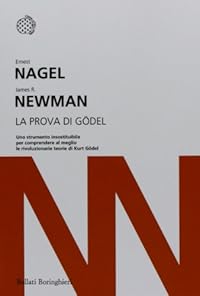Status
Call number
Publication
Description
In 1931 Kurt Gödel published his fundamental paper, "On Formally Undecidable Propositions of Principia Mathematica and Related Systems." This revolutionary paper challenged certain basic assumptions underlying much research in mathematics and logic. Gödel received public recognition of his work in 1951 when he was awarded the first Albert Einstein Award for achievement in the natural sciences--perhaps the highest award of its kind in the United States. The award committee described his work in mathematical logic as "one of the greatest contributions to the sciences in recent times." However, few mathematicians of the time were equipped to understand the young scholar's complex proof. Ernest Nagel and James Newman provide a readable and accessible explanation to both scholars and non-specialists of the main ideas and broad implications of Gödel's discovery. It offers every educated person with a taste for logic and philosophy the chance to understand a previously difficult and inaccessible subject. Marking the 50th anniversary of the original publication of Gödel's Proof, New York University Press is proud to publish this special anniversary edition of one of its bestselling and most frequently translated books. With a new introduction by Douglas R. Hofstadter, this book will appeal students, scholars, and professionals in the fields of mathematics, computer science, logic and philosophy, and science.… (more)
User reviews
They do a particularly nice job in their brief dissemination of the historical concerns that led up
However, there are a couple of real problems with this book.
First, I do not beleive that this book would really be that helpful for "the educated layman". Insofar as their target audience is concerned, the book is, perhaps, a failure. Why do I say this? Given its breivty, the authors are forced to introduce important bits of information without adequate exposition. For example, the notion of universal quantification makes its first appearance in the last twenty odd pages of the book and is explained in a sentence or to. This is fine for anyone that's had an intro logic course (and can recall what was covered) but is probably inadequate for the logical/mathematical novice. Furthermore, this example is just one case of something that occurs quite often throughout the book.
My second worry is that the actual mechanics of the proof are not presented lucidly. This is not altogether unexpected, but the fifteen pages or so that comprise the actual exposition of the proof seem to go by too quickly and sacrifice depth and clarity for readability and brevity. This may not be the authors' fault. I have doubts about whether or not one can successfully offer the sort of exegesis the authors are striving for. That is, I'm just not sure that anyone will ever pull off a lucid "Godel for Dummies".
Final thought: I think this book would best serve the needs of a first year graduate student or advanced undergraduate in philosophy. For the student that has some background in logic (perhaps they've done a completeness proof for FOL or at least some proofs with quantifiers) but has yet to take a meta-logic course this book can provide a nicely structured overview of what the the typical meta-logic course aims for.
For anyone interested in the beauty of logic or the elegance of math, the mechanisms of Gödel's proof are impressive. This book by Nagel and Newman reads quickly--for a math book. The reader must be prepared to slow down and spend five to ten minutes on a page when getting into the thick of the mathematical concepts in use. The reward of doing so is an appreciation of an intellectual event that provided a turning-point in the philosophy of knowledge.
Without a clear and explicit reference to the concept of a formal system all that is said regarding Gödel's theorems is highly inaccurate, if not altogether wrong. For instance, if we say that Gödel's statement is true, after saying that Gödel's Theorem states that it can't be proved either true or false. Without adding "formally", that doesn't really make much sense. We'd only be only talking about axioms, which are only a part of a formal system, and totally neglecting talking about rules of inference, which are what the theorems really deal with.
By independent I mean 'logically independent', that is only a consequence of Gödel's theorem in first order languages, whose logic is complete. In second order arithmetic, the Peano axioms entail all arithmetical truths (they characterize up to isomorphism the naturals), so that no arithmetical sentence is logically independent of such axioms. It occurs, however, that second order logic is incomplete and there is no way to add to the axioms a set of inference rules able to recursively derive from the axioms all of their logical consequences. This is why Gödel's theorems holds in higher order languages too. In fact, this is how the incompleteness of higher order logic follows from Gödel's theorems.
What prompt me to re-read this so-called seminal book? I needed something to revive my memory because of Goldstein's book on Gödel lefting me wanting for more...I bet you were expecting Hofstadter’s book, right? Nah...Both Nagel’s & Newman’s along with Hofstadter’s are failed attempts at “modernising” what can’t be modernised from a mathematical point of view.
Read at your own peril.
